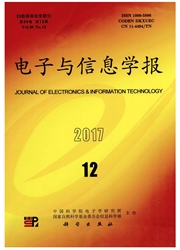

 中文摘要:
中文摘要:
无线传感器网络的拥塞会增加网络延迟、降低网络吞吐量、尤其不利于传感器网络的节能。该文提出了一种能量有效的无线传感器网络拥塞控制机制,主要包括逐跳拥塞反馈和速率调节两部分。节点周期性地计算其上游节点发送速率和本地缓冲队列可用空间,并根据一定策略来推测在当前周期内发生拥塞的可能性;拥塞节点的上游节点收到拥塞反馈后根据自身缓冲队列的使用情况来降低速率,此拥塞节点同时向其下游节点申请提高发送速率;基站根据应用要求以闭环方式调节源速率。仿真实验表明,该文的拥塞控制机制不仅能有效地缓解网络拥塞,还保持了网络吞吐量的稳定并具有良好的能源有效性。
 英文摘要:
英文摘要:
Wireless sensor networks congestion often leads to increasing network latency, decreasing througnput and wasting the limited sensor node energy. In this paper, an energy-efficient congestion control scheme, which can alleviate congestion in wireless sensor networks, is proposed. The scheme includes hop-by-hop congestion message feedback and rate adjustment. Node periodically samples its queue occupancy and the packet rates of its upstream neighbors, and infers whether congestion will occur in the current time interval. Upon receiving the congestion feedback, these upstream nodes decrease their rate according to their local queue occupancies. Furthermore, sink adjusts the source rate related to some event which is beyond or below the application fidelity. The simulation results show that the proposed scheme is more effective and energy-efficient in congestion alleviation than CODA.
 同期刊论文项目
同期刊论文项目
 同项目期刊论文
同项目期刊论文
 期刊信息
期刊信息
